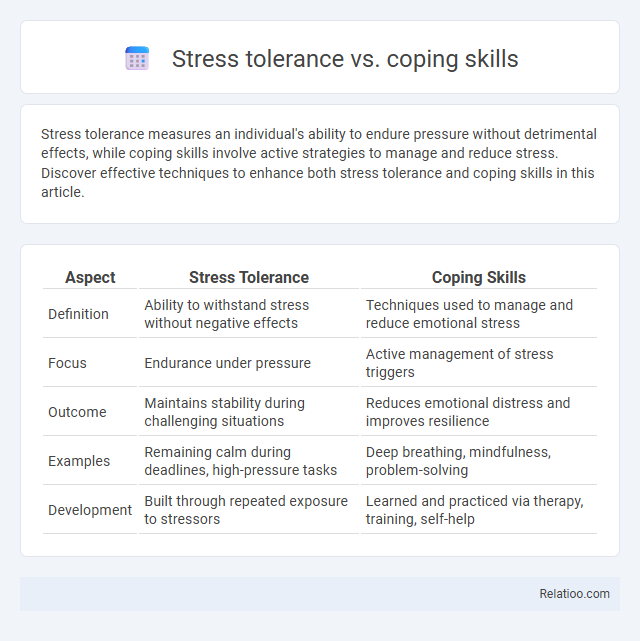Stress tolerance measures an individual's ability to endure pressure without detrimental effects, while coping skills involve active strategies to manage and reduce stress. Discover effective techniques to enhance both stress tolerance and coping skills in this article.
Table of Comparison
| Aspect | Stress Tolerance | Coping Skills |
|---|---|---|
| Definition | Ability to withstand stress without negative effects | Techniques used to manage and reduce emotional stress |
| Focus | Endurance under pressure | Active management of stress triggers |
| Outcome | Maintains stability during challenging situations | Reduces emotional distress and improves resilience |
| Examples | Remaining calm during deadlines, high-pressure tasks | Deep breathing, mindfulness, problem-solving |
| Development | Built through repeated exposure to stressors | Learned and practiced via therapy, training, self-help |
Introduction to Stress Tolerance and Coping Skills
Stress tolerance refers to your ability to withstand or endure stress without experiencing negative effects, while coping skills involve specific strategies and techniques you use to manage and reduce stress. Developing both stress tolerance and effective coping skills enhances resilience, allowing you to maintain emotional balance and performance under pressure. Understanding the distinction helps tailor your approach to stress management, improving overall well-being.
Defining Stress Tolerance
Stress tolerance refers to your ability to endure and function effectively under pressure or in challenging situations without experiencing significant negative effects. It involves physiological and psychological resilience that enables maintaining stability despite stressors, differing from coping skills, which are strategies employed to manage and reduce stress. Understanding your stress tolerance helps identify how much stress you can handle before it adversely impacts your health and performance.
Understanding Coping Skills
Coping skills are essential strategies individuals use to manage stressful situations effectively, enhancing overall resilience and mental well-being. Stress tolerance refers to the capacity to endure stress without significant impairment, while coping skills involve active techniques such as problem-solving, emotional regulation, and seeking social support to mitigate stress impact. Developing strong coping skills improves stress tolerance by enabling adaptive responses to pressure and reducing psychological distress.
Key Differences Between Stress Tolerance and Coping Skills
Stress tolerance refers to your capacity to endure stressful situations without significant emotional disruption, while coping skills are the specific strategies and techniques you use to manage and reduce stress. Key differences highlight that stress tolerance is about resilience and inherent ability, whereas coping skills involve actively implementing methods such as problem-solving, relaxation, or seeking support. Understanding these distinctions can help you improve both your endurance under pressure and your practical responses to stress.
Biological and Psychological Factors Influencing Stress Tolerance
Stress tolerance is influenced by both biological factors, such as genetic predisposition, hormone regulation, and nervous system resilience, and psychological factors, including cognitive appraisal, emotional regulation, and past trauma. Coping skills are behavioral and mental strategies developed to manage stress, shaped by learning experiences and psychological conditioning, which directly impact an individual's capacity to tolerate stress. Understanding the interplay between innate biological mechanisms and adaptive psychological processes elucidates the variability in stress tolerance among individuals.
Types of Coping Skills: Adaptive vs Maladaptive
Stress tolerance reflects your capacity to endure stress without significant impairment, while coping skills determine how effectively you manage stressors. Types of coping skills include adaptive methods, such as problem-solving and emotional regulation, which promote resilience and well-being, versus maladaptive strategies like avoidance or substance use that can worsen stress effects. Developing adaptive coping skills enhances your overall stress tolerance by enabling healthier responses to challenges.
Building Stress Tolerance: Effective Strategies
Building stress tolerance involves developing resilience to withstand pressure and recover from challenges without becoming overwhelmed. Effective strategies include regular mindfulness practices, physical exercise, and maintaining a balanced lifestyle to strengthen your ability to manage stressors. Enhancing coping skills, such as problem-solving and emotional regulation, complements stress tolerance by providing practical tools to address stressful situations proactively.
Enhancing Coping Skills for Daily Life
Enhancing coping skills is crucial for managing stress and improving overall stress tolerance, enabling individuals to navigate daily challenges more effectively. Developing adaptive techniques such as problem-solving, mindfulness, and emotional regulation strengthens resilience against stressful situations and reduces negative psychological impacts. Consistent practice of these coping strategies supports better mental health outcomes and promotes sustained well-being in everyday life.
Assessing Your Own Stress Tolerance and Coping Capacity
Assessing your own stress tolerance involves evaluating how much stress your mind and body can handle before experiencing negative effects, while coping skills refer to the strategies you use to manage and reduce stress. Understanding both your stress tolerance and coping capacity helps identify areas needing improvement, enhancing resilience and overall well-being. Regular self-assessment through mindfulness and reflection on past stress responses can provide valuable insights into optimizing your stress management approach.
Integrating Stress Tolerance and Coping Skills for Resilience
Integrating stress tolerance and coping skills enhances your overall resilience by enabling effective management of adverse situations while maintaining emotional stability. Stress tolerance refers to your ability to endure stress without becoming overwhelmed, whereas coping skills involve the strategies and techniques used to actively address and mitigate stressors. Developing both dimensions equips you to face challenges more adaptively, promoting long-term psychological well-being and improved performance under pressure.

Infographic: Stress tolerance vs Coping skills
 relatioo.com
relatioo.com